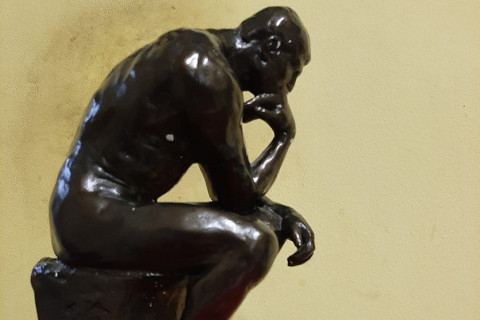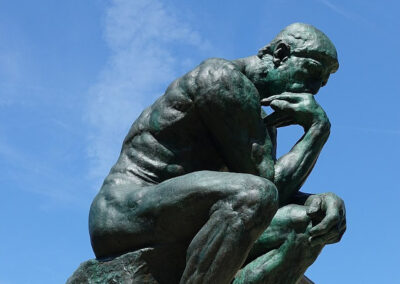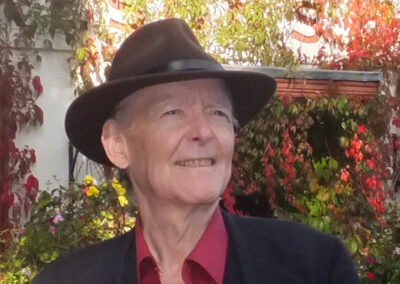The ‘Statement of Principle’ below is followed by some ‘Considerations’ about reflection.
Statement of Principle
For millennia humans have solved extraordinary problems as well as taken advantage of great opportunities through the use of a variety of mental processes. These have been described by various names including meditation, contemplation, introspection and concentration to mention only a few techniques. Today the use of the mind still remains society’s best chance for finding solutions to the array of increasingly tougher problems which present themselves.
Unquestionably we live in a much more complex world than any of our forbears. There is often far more going on around us than we can easily grasp. In almost every respect there are more opportunity for most levels of society with considerable rewards for those who are successful. And this greater range of opportunities means we typical face many more decisions than ever before.
Furthermore, we have through the use of information and communications technology intensified the need for greater levels of immediacy in the way that we both plan and live out our lives and this is obviously reflected in our decision making. The amount of information thrust at us can be nothing less than overwhelming. And many if not most things happen much faster than ever before.
The increase in complexity and the need for rapid responses to opportunities and challenges can lead to flaky decision-making. By flaky decision making is meant that the results of decisions will not necessarily produce the desired result not will any good result be necessarily sustainable.
So, what can be done?
The Institute of Reflection believes that the act of reflection can come to our aid and greatly improve decision-making. What the Institute proposes is that decision makers pause and consider a series of questions which will include inter alia, Have I really understood the current situation? Have I taken into account all the options available to me? Do I really understand the implications of the courses of actions I am considering? What should I consider to be a success? Effectively these questions move towards focussing the mind on the critical success factors of the project. There are obviously many more questions which could be asked but these 4 examples should give readers an idea of what is involved.
What is required is the ability to pause as opposed to make snap decisions. Then the decision maker needs to exercise his or her imagination to produce a number of penetrating questions which will help clarify the issues involved in the decision. There is little doubt that this will increase the probability of success and furthermore it will almost always make the decision maker feel better about the decision he or she will make.
This type of reflection is nothing more or less than what we would expect from a mature decision maker with a degree of emotional intelligence when undertaking an important decision. But no doubt there are many decision makers who need support in achieving this.
Of course, reflection can involve more than asking and answering these types of relatively straight forward questions. There is a deeper level of internal inquiry which those involved in academics research sometimes engage with. This is known as using reflexivity and involves standing further back from the project under consideration and inquiring about the values of the individual faced with the decision. The type of questions asked in a reflexivity exercise are more to do with the values of the researcher and how the outcome of the project will affect him or her and their colleagues and perhaps even the society at large. Here are the questions take the form of why questions such as Why am I engaged with this project at all? Why do I think that this project will benefit me? Why should my colleagues be as enthusiastic about this project as I am? In what way will this project lead to a better situation for all of those concerned? Once again these are only a few example questions.
It can be perceived from the above questions that reflexivity offers an opportunity to challenge the decision makers values.
Whereas almost everyone would agree that regular reflection is a good thing, after all thinking about one’s circumstances and the people around one is a mark of maturity and emotional intelligence, the idea of reflexivity is nowhere as widely accepted as it should be. Many believe that reflexivity can perhaps be a step too far and that it is not necessary to challenge one’s values, at least not regularly.
From the Institute of Reflection’s point of view both reflection and reflexivity are techniques which can be of value to many people in their daily lives as they cope with the high complexity and the speed required in the environment in which we currently live.
To see how Academia views reflection, please scroll down to the relevant Landing Box below.
TWELVE CONSIDERATIONS
FOR REFLECTION
1) Thinking quietly on one’s own is to be encouraged.
2) ‘How we think’ is a subject worthy of study. We should make a point of taking time out to think. Like anything else (as the Victorians said) ‘Practice makes (almost) perfect.’
3) There is value in thinking as deeply as possible about the far-reaching questions in our lives, viz: What can we know for sure – in as far as it is possible to know anything for certain? What are the questions and beliefs that truly matter? Do scientific discoveries impact on some of them?
4) Meditation and its goals need not be taught – but learned. We should try and coach ourselves.
5) Do all of our cherished beliefs or habits withstand scrutiny? It should be or become a habit to query what we read or hear about the topics that matter and to cultivate a healthy disrespect for prevailing assumptions – including our own.
6) Profound truths may be simple and accessible – but overlooked. First pare down the focus to the fundamental assumptions. From acorns do oak trees grow.
7) Unemotional open-mindedness should characterise reflection.
8) In calmness lies self-awareness. It is the breeding ground in which to try to coax insights that may have lain disregarded in the subconscious to the surface of the mind.
9) Reflection and Intuition – after due consideration – should feed through into practical outcomes and enhance Practical Wisdom.
10) A constant refrain can be: ‘What is the right way forward?’
11) We should be as true as possible to our better selves and try to refashion ourselves so as to reach all worthwhile goals. Fulfilment, empathy, compassion, happiness, success and more should characterise a well-balanced life. ‘Know thyself’! Be true to yourself.
12) ‘Straggle-growths’ in the mind can be trimmed. Undue emotions and ‘mind-clutter’ should be studied not blanked out, then outfaced with clarity, honesty and independence of mind.
FURTHER CONSIDERATIONS
A list such as that above is rarely the whole story. Ideas of relevance can crop up in general conversation or in reflection – or in pointers throughout this website.
The word ‘meditation’ seems to have acquired a capital ‘M’. It can imply an orientation towards the oriental. Westerners have a vantage point on cogitation that has been long in the brew. We all can borrow from the best of both traditions. Some Buddhist or Tao principles, for instance, can be buttressed by Western scientific discovery. In a world rife with serious problems, the hard-won hallmarks of civilised thinking should be ‘grappled to the bosum with hoops of steel’.
An aim of this virtual institute is to help create a level of consciousness that is a benchmark of civilised standards that can influence, for instance some of the political decision-making in the long-term. Go to politicos of today with some of the prescriptions in this institute and it is likely that many of them will not spare the time of their pressurised day to consider or act on them but, overall and over time, the Geist changes. It becomes clearer if decisions are taken in the light of outmoded geostrategic thinking.
There is an appetite shared by many people including those living full, active lives to wonder about the Big Questions. There is no call to shelve them. An ability to multi-task and to plan for exigencies of the day need not make a pipedream of taking time out to think things over.
A rational, clear-minded, serene and detached look at how much we truly know and at what we as individuals and as a society should do, can go hand-in-hand with spirituality, ‘finding oneself’ – one’s true self – and lateral thinking.
Scientific breakthroughs bear on what we now know about the often intangible world that arguably actuates us – and many Faiths.
How best to hone basic conceptions so as to be in line with what is best for each and all of us? We may be surprised at what emerges perhaps from unlikely quarters. It may lurk in our own mind. It is time is to refresh some age old, wise – and maybe not so wise – precepts.
The best habits of mind are rarely a quick fix. Reflection is a natural fallback position and should be given attention.
Anyone may have interesting, fresh ideas in spheres ranging from the practical to the profound and the insightful. What of value may be lost if many ideas in a community where each of us can have our say within reason share the fate of the proverbial rose that blooms only to wither unseen. Experts even where they agree need not be sole judges of what holds true in contexts impacted by their specialisms. We are free to be our own gurus or pundits.
This forum is a meeting ground and a platform to showcase ideas that may have traction in the wider world. The fruits of homespun philosophy should have the best cultivation before being set out on a stall in the global village.
This approach ideally should reinforce an understanding of our place in this world and what might be the Hereafter and help to constructively query insufficiently thought-through ideas that permeate society. We can see more perceptively when discarding the dross. The process enhances personal fulfilment, peace and happiness.







